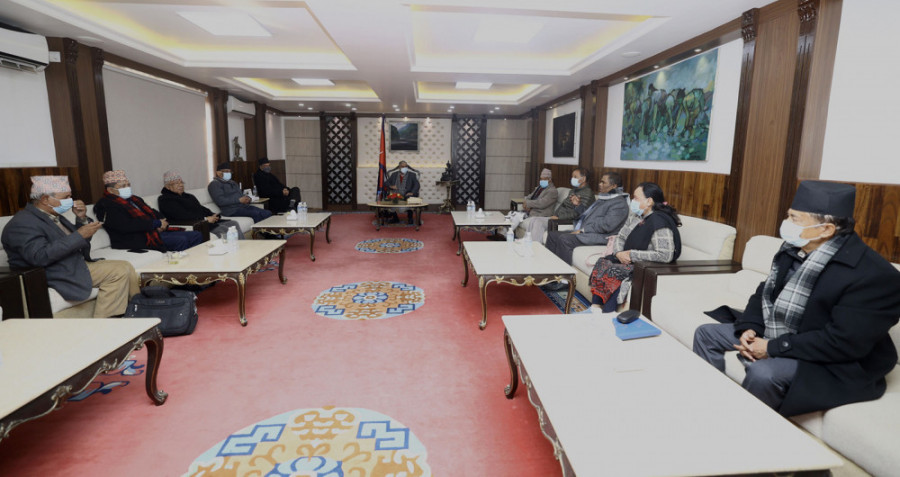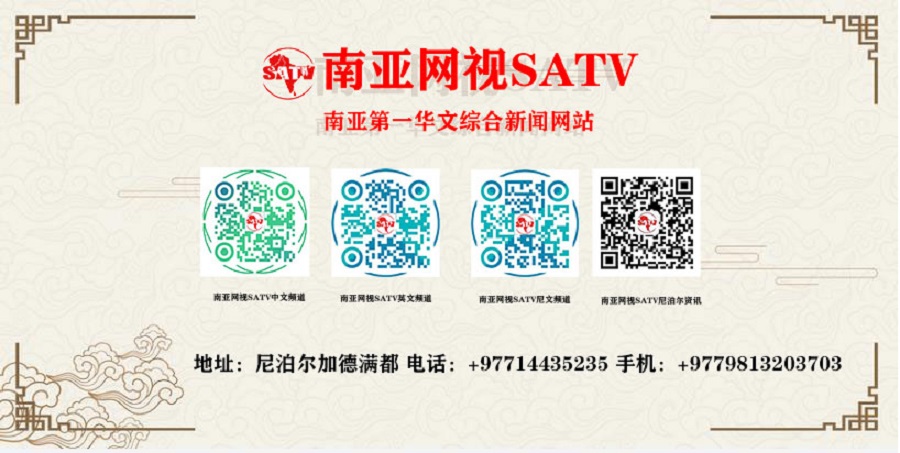
It all started with a proposal by Communist Party of Nepal (Maoist Centre) chair Pushpa Kamal Dahal, and it has now spiralled into a full-blown political debate. Now some key questions have also arisen.
At a meeting of the high level political coordination committee on January 18, Dahal, by his own admission, proposed that parliamentary elections should be held in April-May instead of local polls at that time.
His proposal came at a time when the Election Commission had already proposed April 27 and May 5 as the local poll dates.
The political coordination committee, led by Ram Chandra Poudel, then decided to consult legal and constitutional experts after there was a dominant view that all three tiers of election should be held simultaneously.
The select group of experts suggested that there is a leeway to hold local elections six months after the expiry of the terms of existing representatives.
Those seeking to delay local polls have argued that since the election laws are not consistent with the constitution, they need to be amended to make them compatible with the country’s top law.
The process to draft an amendment bill to revise the existing Local Level Election Act has already begun, according to Ganga Lal Tuladhar, deputy general secretary of the CPN (Unified Socialist). A group of experts in coordination with the Ministry of Law, Justice and Parliamentary Affairs will prepare the first draft “as per the decision of the coordination committee.”
But what is the high level political coordination committee anyway?
Neither the constitution nor any law recognises the committee formed by the five-party ruling alliance.
The main opposition CPN-UML has already opposed the idea of delaying local elections, saying that such an exercise by the ruling alliance is against the rule of law. Even within the ruling Nepali Congress, there is a section which is opposing Dahal’s proposal, which has been seconded by the CPN (Unified Socialist).
Some Congress leaders say a decision on such a crucial issue like elections is being decided by the coordination committee, while there have been no discussions on the matter in the political parties’ legitimate bodies.
Dhan Raj Gurung, a Congress vice-president, said there has to be intense discussions within the party organisations and all-party meetings before deciding on such important matters.
“A mechanism that doesn’t have any legal and constitutional recognition shouldn’t be taking decisions and dictating the government,” Gurung told the Post. “It would be better if the parties discuss the issue at their committees, which are legitimately elected entities, then take the matter to all-party meetings before any decision is taken.”
Gurung’s party is yet to discuss the matter at the Central Working Committee which is the legitimate body elected by the general convention.
Though Tuladhar claimed that his party has discussed the matter in the party’s Standing Committee, other parties haven’t held formal discussions on the issue.
The Maoist Centre hasn’t discussed the issue at its Central Committee while it is yet to constitute the Standing Committee. The Janata Samajbadi Party, another party in the alliance, too hasn’t held its Central Committee meeting for quite a while.
The five-party alliance’s coordination committee itself is a controversial entity.
It was basically Dahal’s idea to constitute such a committee “to assist the government.” He had pushed a similar idea during KP Sharma Oli’s tenure as prime minister when both were together in the same Nepal Communist Party (NCP) formed in May 2018 after a merger between the UML and the Maoist Centre. An infighting in the NCP—a tussle between Oli and Dahal to be precise—led to the party’s invalidation in March last year. Nepali Congress President Sher Bahadur returned to power with the backing of Dahal’s Maoist Centre on July 13 this year.
The committee was formed in November last year amid controversy. Multiple leaders and observers had called it a farce and said Dahal has a tendency to push for such a mechanism to ensure that he can have his say in governance and various other issues when he is out of power.
This time, Dahal used the mechanism to influence other political leaders, including Prime Minister Deuba, to postpone local polls.
Experts say the recent move of the ruling parties demonstrates the lack of consultative culture, which is fundamental in a democracy, among the parties.
Daman Nath Dhungana, a former Speaker and civil society member, says the coordination committee is an extralegal entity which alone shouldn’t be allowed to take decisions on issues like elections.
“Leaders are guided by self-interest so they tend to avoid larger discussions where their ideas could be rejected,” Dhungana told the Post. “Parties avoiding inter- and intra-party discussions and taking decisions from an extralegal mechanism cannot be a democratic culture.”
According to Dhungana, no matter what argument top leaders of the ruling parties offer, not holding local elections latest by May will be in violation of the constitution.
Those avoiding local elections in April-May have been making their arguments by misinterpreting a constitutional provision, some experts and leaders say. The constitution actually does not envision a vacuum at the local level, according to them.
Amid the ongoing wrangling over delaying local elections, the Election Commission on Tuesday urged the government to announce the dates without any further delay. Issuing a statement, the commission said the delay in announcing poll dates could cause complexities in holding the elections managerially and technically. The commission has been saying the local polls should be held on April 27, if they were to be held in one phase and on April 27 and May 5, if voting is staggered into two phases.
Experts and former election officials have for long been saying that until the Election Commission is given the full authority to declare election dates, politicians and political parties will continue to push for conducting polls at the dates that suit them best.
It is unfortunate that political parties have made the Election Commission toothless and made an extralegal coordination committee a powerful entity, according to experts on constitutional affairs.
Raju Prasad Chapagain, former chair of the Constitutional Lawyers’ Forum, said Maoist Centre chair Dahal has used the committee to impose his ideas on the Deuba government.
“The government seems to have become a pawn of the committee which is unfortunate,” Chapagain told the Post. “Deuba is dancing to the tune of the committee where Dahal holds sway. The country is going to suffer as the committee is prevailing over the government.”
Some experts say the Poudel-led committee’s role should have been limited to discussing some issues related to governance, as the current government is a coalition one of five parties. But it appears to have become a decision-making entity and is taking decisions on issues of national importance, according to them.
Bipin Adhikari, a former dean of Kathmandu University School of Law, said Deuba's commitment to democracy will be questioned if his government decides to postpone local polls.
“He is accepting what the committee says because he fears a split in the alliance which will push him to minority,” Adhikari told the Post. “But even if the coalition falls apart, it is his government that will hold the polls. Deuba is in a comfortable position.”













